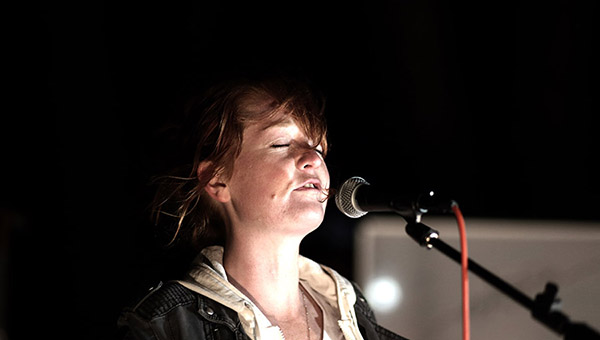
I hate poetry.
All my life I’ve managed to skillfully avoid it. I sniggered with the rest of the skeptics at the “wannabes” trying to be “deep”. I tactfully chose the test questions on novels and theory in all my English Literature tests during my undergraduate studies, and throughout my postgraduate career, also in English Literature, I vaguely responded to discussions on Plath and Cummings and deflected to their novels.
I attended my first InZync poetry session on 19 October 2012, only because a large group of my friends were going and FOMO threatened my social death. I half-heartedly listened to the performances on stage, but was more dedicated to buying drinks at the bar and hovered on the outside, chatting to the odd acquaintance who ducked out for a cigarette. Then I met Kate Ellis-Cole (read her latest report on cartoonist Jerm’s recent launch here - Ed). We quickly became friends and I started attending more and more poetry sessions to see my mate set it up and break it down on stage. I’ve never known someone to be as passionate about words as Kate is, that takes poetry as seriously as she does, that exudes it from every pore.
She introduced me to Adrian Different and Pieter Odendaal, the minds behind the InZync sessions, and the sincerity with which they proclaim their love for poetry touched me. Pieter’s work resonates with traits of the old greats like Opperman and Leipoldt and with a touch of modern Breytenbach and Krog. On the other side of the spectrum Different fires provocative words in tight beats that coax your heart to palpitate to his rhythm. Nothing more palpable could convey the diversity in poetry than these two. My attitude towards poetry started to change.
When I met Alison-Claire Hoskins I felt slightly star-struck. Her stage presence is magnetic and the sophistication of her talent is displayed in the complexity of the imagery she uses to explore multitudes of connotations.
I started writing reports on InZync for SLiPnet and my engagement with poetry deepened; so did my feelings of hypocrisy. I’m a literary scholar, I know how to analyse texts and excavate meaning from layers of suggestion and connotation. But who am I to write this critique? I’m not Kate, or Adrian, or Pieter. I’m not Allison or a wordsmith like Thabiso Nkoana. I’m safe. I get to sit in the audience and judge the naked performer on stage, fully clothed behind the fourth wall: Your imagery is clichéd, That rhyme is forced, I’ve heard this topic a million times before.
I hate poetry. I hate poetry because it scares me. It’s one of the most daunting practices I’ve come across. Edged on by Diff I decided to reluctantly perform at an InZync open mic slot and then at the most recent InZync Poetry Spring Slam. I told myself I’d do this to experience the other side to the coin. I’ve spoken to Kate and Diff about their process of writing, but it wasn’t until I actually sat down and started slicing at the page that my admiration for their talent turned humbling. Do I write according to a predetermined beat or do I figure out what the inherent beat is to what I’ve written? How do I find rhymes in words that sit interestingly together, but not come across as clichéd or just plain bad? What if no-one cares about what I have to say? This is no good. This is embarrassing.
This is why I hate poetry. It takes a hell of a lot of guts to present something you’ve written. And hard work - to edit and revise your words, sure, but also to reconstruct your own insecurities. The lights on the InZync stage blind you, so that you can only make out the ghostly silhouettes of the audience members – no facial responses, no smiles or frowns. There are cameras in your face all of the time and the mic makes sure your voice travels to every nook of the room, which means nothing of what you do is lost or hidden. There’s nowhere to hide. You’re completely exposed. And it’s one of the most thrilling experiences I’ve ever had. From the second I opened my mouth all insecurities dissipate.
The energy coming from the InZync crowd is different to anything I anticipated. They laugh with you, they mourn with you, they listen to every word that leaves your mouth with an intensity that’s overwhelming and welcoming and supportive. Because the group of people who rendezvous here on the odd Friday night, the organisers, the emcee, the heavyweights, the photographers, the DJ’s, the performers, and every single audience member knows this secret (something I’ve only recently been let in on): there’s poetry in everything. And this is the thing: once you've been opened to accept this fact it changes your engagement with the world. You start to notice the quality of your everyday words, their tone, their rhythm, the beat explosives create. You start to notice silences in words and emphases in pronunciation. Language transforms into images and images are translated into language. You take note. Of everything. And it doesn't matter whether you're able to relay this with the skill of Wordsworth or Shakespeare or Blake because, ultimately, writing is about peeling back your skin and exposing your essence. And there's authenticity in that. There's beauty in that. There's poetry in that.
So yeah, now I hate poetry even more. Because I'm completely hooked.
 SLiPStellenbosch Literary Project
SLiPStellenbosch Literary Project 